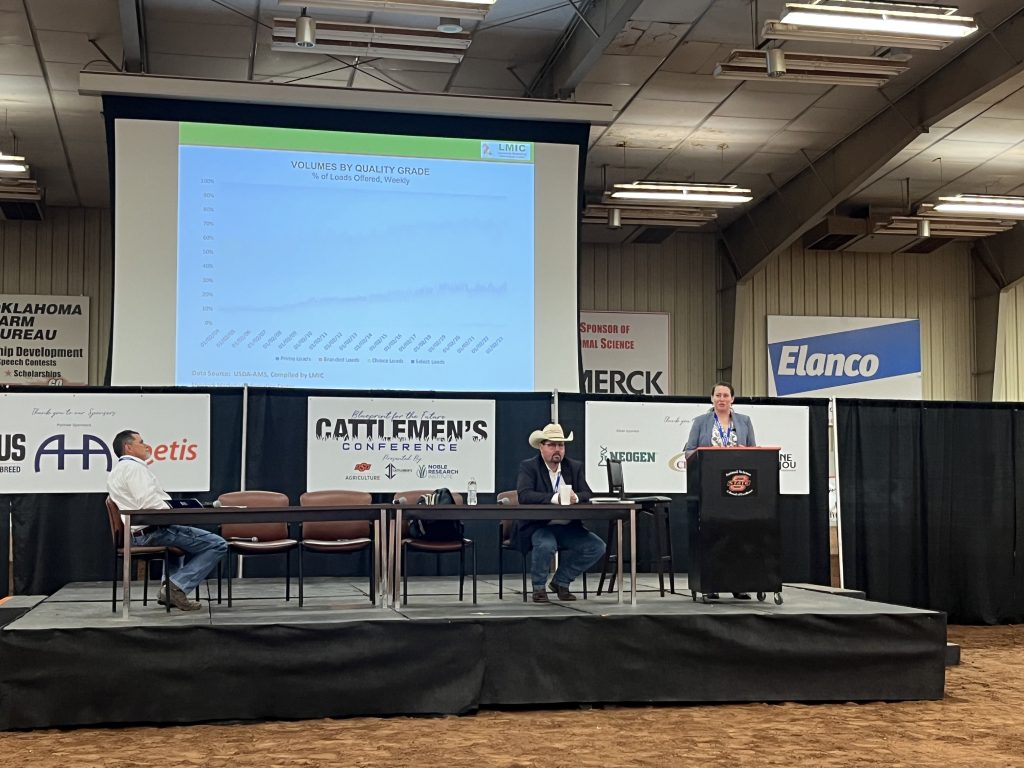
At this year’s Cattlemen’s Conference, Blueprint for the Future, Radio Oklahoma Ag Network Intern, Maci Carter, had the chance to visit with Katelyn McCullock of the Livestock Management Information Center about consumer and economic trends of the next decade.
As a speaker at Cattlemen’s Conference, McCullock was asked about the future of the beef industry moving forward.
“Beef prices at the retail level have remained relatively stable thus far,” McCullock said. “What that tells us is that we’re probably not losing a lot of demand, but they haven’t really been able to go any higher. So the question is, do we eventually hit a price point where things really back off? I think we do. But with the recessionary pressure that the consumer might be feeling, that might actually not actually happen until maybe 2024 or 2025.”
As forecasts are only available through 2024, McCullock said a daily record-high for fed cattle has already been reached in April, which has moved down slightly since. McCullock said she expects an all-time annual average record high in 2025.
The beef cow herd declining in 2023 and 2024, McCullock said, means the new all-time record high is yet to be seen. This does not mean new record highs will not be set in between now and the all-time high.
“So beef exports in terms of volume for both 2021 and 2022 are new record highs, which is fantastic for the beef industry,” McCullock said.
McCullock said trading down for cheaper proteins is happening in the beef industry, but there are many factors that play into this. From less variety at the meat counter to the relative prices of other products that are usual trade downs for beef, and the price pressure from other commodities.
“The thing that to watch is going to be the center of the plate cuts and how those things move either together or not together and how relatively expensive they are,” McCullock said.
Exports for beef have been strongly driven by high demand in China, McCullock said, including Japan and Korea.
“Beef exports in terms of volume for both 2021 and 2022 were new record highs, which is fantastic for the beef industry,” McCullcock said.
McCullock said 2012 and 2022 have been record-breaking years in terms of volume, however, the Chinese markets that were consuming this commodity are starting to back off. She said her main concern is how expensive beef is going to become in other countries, but she’s still confident the U.S. beef industry will have great growth potential outside of our borders moving forward.
“Anytime there is a new wave of consumer preferences that dramatically shift protein consumption, either to or away from protein, it can have a pretty major impact on how consumers consume beef and what choices they’re making,” McCullock said. “Generally speaking, total protein may be more impacted by the financial aspect of the consumer more than diet trends, I think in the near term. That’s going to be a pretty big thing to overcome.”
McCullock shared that diet trends can have a large impact on beef consumption. These unavoidable cultural changes have a large impact on how much beef our consumers are purchasing at the grocery store, so marketing to combat these fads is important in keeping the beef industry prevalent.
“I would say most consumers already agreed they like beef, and so you’re basing less choices maybe on tastes and preferences because they already know they like it, and it might not become too different,” McCullock said. ” They might be making those choices on non-carcass merit things like the environment, animal welfare, how it was raised, etc. So those might become a bigger aspect of how we need to market beef in the future.”
Another important cultural change is generational preferences. McCullock said, as each generation has a different preference in terms of beef consumption. She said she predicts the newest generation will base their decisions more on non-carcass and ethical merits rather than taste, and that is something that producers have to account for and adapt to.
“I think that financial aspect will eventually probably erode some demand,” McCullock said.
“I just don’t know when, and how long it lasts might depend on how high actual beef prices get.”
Katelyn said she understands the impact recent inflation has had on individuals from all sides of the equation. In terms of the beef industry, McCullock said she predicts some demand will be diminished by inflation,but it is too early to say.















